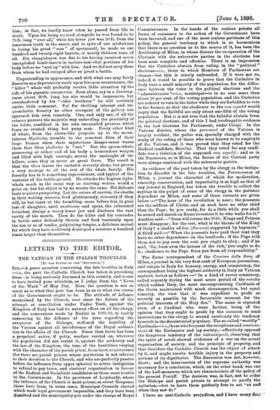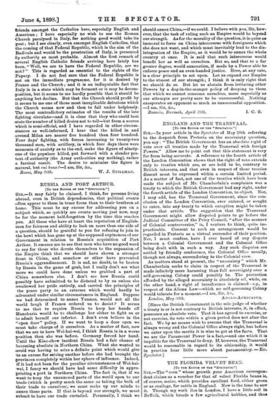LETTERS TO TIIE EDITOR.
THE VATICAN IN THE ITALIAN TROUBLES.
[To TISK EDITOR OF THE " SPECTATOR:1
Sin,—A grave question concerning the late troubles in Italy —i.e., the part the Catholic Church has taken in provoking them—is being seriously discussed in this country, and seems to have invited your attention, as I judge from the "News of the Week" of May 21st. Here the question is not so much as to what that part has been as as to what the course of the Government ought to be. The attitude of defiance maintained by the Church, ever since the failure of the attempt at conciliation under Padre Tosti, against the Kingdom of Italy has bad its natural effect on all the clergy, and the concessions made by Rndini in 1S91-92, in tacitly consenting to the defiance of the laws regarding the exequatur of the Bishops, stiffened the hostility of the Vatican against all interference of the Royal authori- ties in the affairs of the Church. Since then there has been a perpetual active, if petty, warfare carried on, wherever the population did not resent it, against the authority and the law of the Kingdom, the tone of the hostilities varying with the character of the parish priest, from inert acquiescence (for there are parish priests whose patriotism is not inferior to their devotion to the Church, and who are perfectly passive before the influence from upper spheres) to active instigation to refusal to pay taxes, and electoral organisation in favour of the Radical and Socialistic candidates as those most hostile to the Government. In the provinces of Lombardy, where the influence of the Church is most potent, as about Bergamo, there have been, in some cases, Municipal Councils elected which made legal government impossible, and they have been dissolved and the municipality put under the charge of Royal
Commissioners. In the hands of the zealous priests all forms of resistance to the action of the Goverument have been favoured, and one of the most zealous partisans of this policy, the general tendency to which is so harmonious that there is no question as to the source of it, has been the Archbishop of Milan, in whose diocese the co-operation of the Clericals with the subversive parties in the elections has been most complete and effective. There is an impression that the Catholics abstain from voting in the "political ' elections—i.e., those in which Members of Parliament are chosen—but this is utterly unfounded. If it were not so,. indeed, it would be possible to prove that the Catholics in Italy were a small minority of the population, for the differ- ence between the votes in the political elections and the "administrative "—i.e., municipal—is in no case more than about 20 per cent, of the voting population, and the Catholics. are ordered to vote in the latter while they are forbidden to vote in the former, so that the obedience to the non expedit would imply that the faithful are only about one-fifth of the voting population. But it is not true that the faithful abstain from the political elections, and of this I had irrefragable evidence. in the last elections for Parliament, under Crispi. In the-
Vatican district, where the personnel of the Vatican is largely resident, the police was specially charged with the study of the voting of those who were known to be employee of the Vatican, and it was proved that they voted for the Radical candidate, Barzilai. That they voted for any candi- date was a violation of the supposed non fxpedit ; and as in the Trastevere, so in Milan, the forces of the Clerical party were always combined with the subversive parties.
As evidence of the part taken by the clergy in the instiga- tion to disorder in the late troubles, the Perseveranza of Milan, a journal the character of which for moderation, sincerity, conservatism, and impartiality is as high as that of any journal in England, has taken the trouble to collect the sayings in the pulpit of some of the clergy in the parishes dependent on Milan, and some of these extracts are given below :—" The hour of the revolution is near ; the peasants are the soldiers of Christ, and as such have no other chief than the Pope ; be you ready, for in a little while you shall be armed and march on Rome to restore it to who waits for it.' Another said:—" Soon will return the 1848; Kings and Princea. must disappear; for the rest, what is the throne of the King of Italy? a shabby edifice (Baracca) supported by bayonets." A third said :—" When the peasants have paid their rent they have no other dependence on the landlords ; if the Pope told them not to pay even the rent you ought to obey ; and if he said, 'Go, burn even the houses of the rich,' you ought to do- it ; obedience to the Pope frees you from all responsibility."
The Rome correspondent of the Corriere della Sera, of Milan, a journal in the very first rank of European journalism, and unique in Italy for honesty, energy, and competency, the. correspondent being the highest authority in Italy on Vatican. matters, writes as follows :—" In a kind of secret consistory,. called urgently during the most acute period of the revolts which sadden Italy, the most uncompromising Cardinals of the Curia maintained with much circumspection, but equal tenacity, the view that it was expedient to profit as secretly as possible by the favourable moment for the political interests of the Holy See." The name is repeated even, of a Cardinal who went farther, being of the opinion that they ought to profit by the occasion to send' instructions to the clergy to second cautiously the tendency to revolt in the discontented populace. The so-called "worldly" Cardinals,—i.e., those who frequent the receptions and conversa- zioni of the Embassies and lay society,—effectively opposed the dangerous tendency of the intransigenti, observing that the spirit of revolt showed evidences of a war on the actual organisation of society, and the principle of property, and that therefore the Catholic Church was the object of attack by it, and might receive terrible injury in the property and persons of its dignitaries. The discussion was not, however,. short ; and the intervention of the supreme authority was. necessary for a conclusion, which, on the other hand, was one the half-nseasures which are characteristic of the policy of the present Pontiff. The decision was, in fact, not to order- the Bishops and parish priests to attempt to pacify the agitation,—but to leave them perfectly free to act "at and when they saw fit."
I have no anti-Catholic prejudices, and L have many dear - friends amongst the Catholics here, especially English and American ; I have especially no wish to see the Roman Church paralysed in Italy, for nothing good would take its post ; but I see clearly, even amongst English Catholics, that the coming of that Federal Republic, which is the aim of the Radicals and would be the prostration of Italy, is presented by authority as most probable. Almost the first remark of several English Catholic friends arriving here lately has teen, "Well, we are to have the Federal Republic, are we not?" This is regarded as essential to the rights of the Papacy. I do not feel sure that the Federal Republic is not on the immediate programme, for it is desired by France and the Church ; and it is an indisputable fact that Italy is in a state which may be ferment or it may be decom- position, but it seems to me hardly possible that it should be anything but decline. But that the Church should profit by it seems to me one of those most inexplicable delusions which the Church seems now and then to fall under helplessly. The most contradictory estimates of the results of the late -fighting circulate—and it is clear that they who could best state the number of killed desire not to tell—bat from a source which is semi-official, and I have regarded in other circum- stances as well-informed, I hear that the killed in and around Milan are nearer five hundred than four hundred. Four days' fighting, with forces increasing to twenty-two thousand men, with artillery, in which four days there were moments of anxiety as to the end, make the figure of ninety- -one of the populace killed, put forward with a slender pre- text of authority (the Army authorities say nothing), rather a farcical result. The desire to minimise the figure is natural, but cui bon° 1—I am, Sir, &e.,



































 Previous page
Previous page